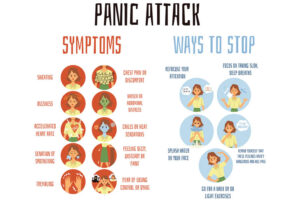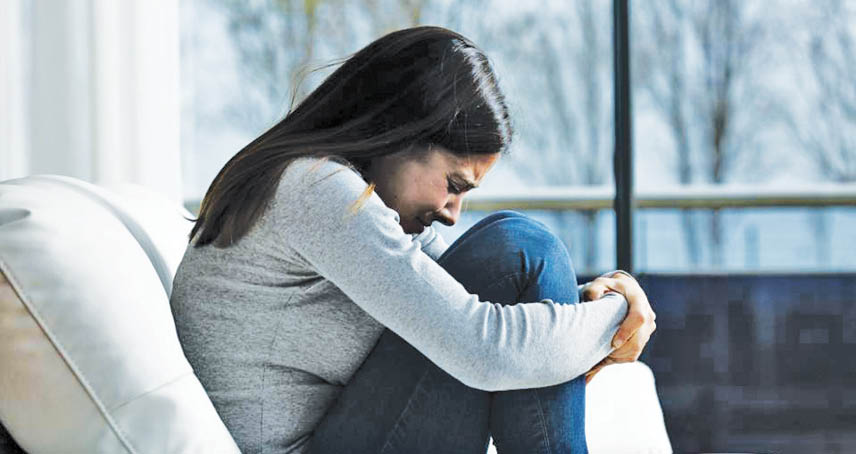 A panic attack is a sudden episode of intense fear that triggers severe physical reactions when there is no real danger or apparent cause. Panic attacks can be very distressing – they arrive suddenly and involve intense and often overwhelming fear. They’re accompanied by very challenging physical symptoms, like racing heartbeat, shortness of breath, or nausea.
A panic attack is a sudden episode of intense fear that triggers severe physical reactions when there is no real danger or apparent cause. Panic attacks can be very distressing – they arrive suddenly and involve intense and often overwhelming fear. They’re accompanied by very challenging physical symptoms, like racing heartbeat, shortness of breath, or nausea.
When panic attacks occur, you might think you’re losing control, having a heart attack or even dying. Although panic attacks aren’t life-threatening, they can significantly impact the quality of your life.
Here Are Some Effective Ways And Practices To Stop/Control A Panic Attack:
Educate Yourself – Know the Signs: It’s not just scary or stressful situations that trigger a panic attack. You could be in your most natural environment – at home or a restaurant – and still experience the strong emotions and fearful sensations. This can also bring about physical symptoms like a pounding heart, sweating, shortness of breath, nausea, chest pain, and/or trembling. An average panic attack lasts 5 to 20 minutes. Once you learn to recognize when attacks are coming on, you are better equipped with ways to stop them.
Do Not Stop Living Your Life: It’s understandable that you’d want to avoid a panic attack at all costs. But it’s important not to let fear hijack your routine life. For example, don’t avoid places where you’ve had panic attacks in the past. If you have one, stay where you are, if it’s safe. When the attack is over, you’ll realize that nothing terrible happened.
Verbalise Your Thoughts: When you feel a panic attack coming on, remind yourself that you’re feeling anxiety, and not real danger. You can even try directly addressing the fear. Practice a go-to response like, “I am not afraid” or “This will pass.”
Don’t Distract Yourself: As tempting as it may be to try to focus your mind elsewhere, the healthiest way to deal with a panic attack is to acknowledge it. Try not to fight your symptoms. But keep reminding yourself that this will pass.
Stop The ‘What Ifs’: Panic attacks feed on thoughts of “what if.” What if I can’t do it? What if I run into my ex? What if everyone laughs at me? Acknowledge that fear, then shift from “what if” to “so what?” Sometimes the worst-case scenario isn’t as bad as it seems. Remember, the worst case scenario is never usually the likely case scenario.
Breathe Through It: An attack may make you take quick, shallow breaths, so get your breathing under control. Close your eyes. Put your hand between your bellybutton and the bottom of your ribs. Inhale through your nose slowly and deeply. Then let all that air out gently through your mouth. You’ll feel the hand on your belly rise and fall. If it helps, you can count from 1 to 5 on each inhale and exhale. After a few minutes, you should start to feel better.
Slow Down: Slow your body down, and your mind will follow. Practices like yoga, mindful breathing or/and tai chi use slow body movements and train the mind to be calm and aware.
Focus On The Present: Notice five things you can see around you. Then, four things you can touch. Three things you can hear. Two things you smell. One thing you taste. When you stay grounded in the present, it gives your mind something better to do than focus on fear or have worrisome thoughts.
H.A.L.T. Your Attack: ‘H.A.L.T’ stands for ‘Hungry, Angry, Lonely, Tired’ – four feelings that bring out the worst in everyone. If you’re prone to panic attacks, they can turn into triggers. When symptoms pop up, check in with yourself: Am I hungry? Am I angry? Once you pinpoint what’s going on, you can take steps to fix it.
Be Mindful Of Your Consumption: Caffeine can make you feel nervous and shaky. It can also keep you awake, which can trigger tiredness later. Nicotine and alcohol can make you feel calm at first, then make you jittery as your body processes it. All three can trigger panic attacks or make them worse. These are best avoided.
Make Time To Exercise: Physical activity lowers stress, which is one of the main causes of panic attacks. A workout, especially the aerobic kind that gets your heart pumping, can also get you to a calmer place. Even a 10-minute walk can help, for starters.
| IMPORTANT DISCLOSURE: Please note that all the points mentioned are not a substitute for professional help. If you find yourself having difficulty coping with panic attacks, please reach out to a qualified mental health professional. |
- The Food And Mood Connect: Eating Your Way To A Healthier Mind - 1 March2025
- Beating The ‘Cascade Effect’ In 2025 - 28 December2024
- How Body Posture Shapes Mental Health - 9 November2024
